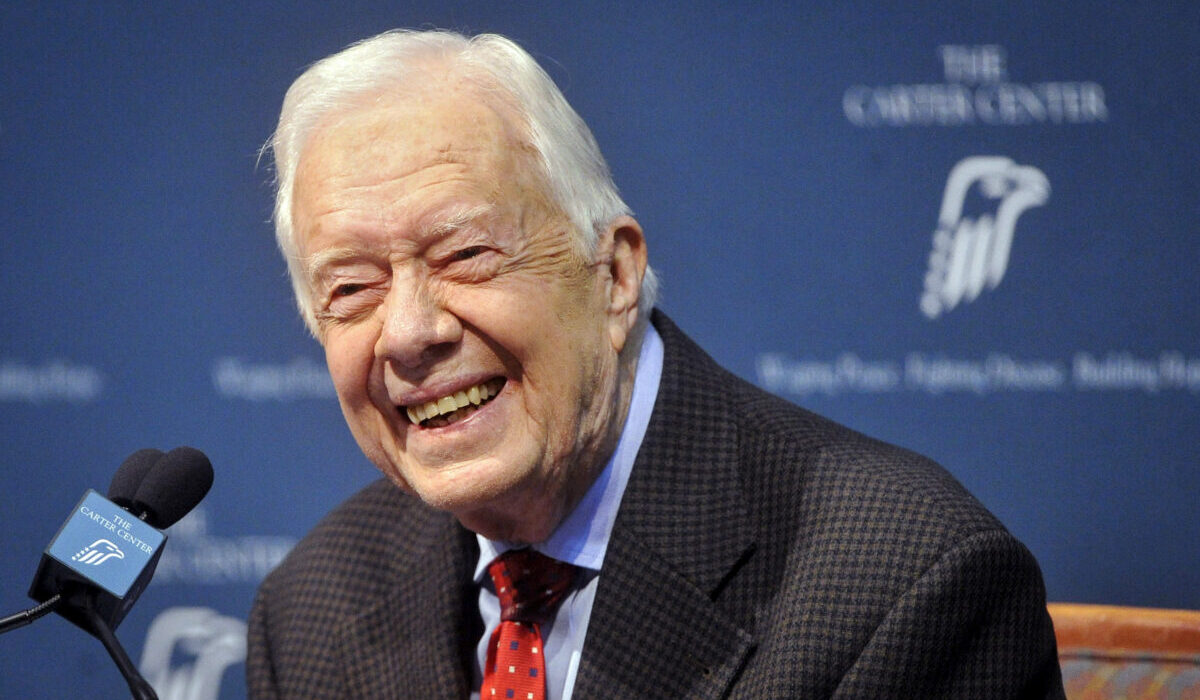Jimmy Carter, the 39th president of the United States, who rose from a peanut farm in Georgia to the highest office in the nation during a time of post-Watergate cynicism and later redefined the role of a former president through decades of humanitarian work, died on Sunday at his home in Plains, Ga. He was 100.
The Carter Center announced his death in a statement, noting that he passed away peacefully, surrounded by his family. He had been in hospice care for more than a year. His wife, Rosalynn Carter, with whom he shared nearly eight decades of marriage, died just weeks earlier in November 2023 at 96.
Mr. Carter’s life traced an extraordinary arc — from a Navy officer and peanut farmer to a one-term president who suffered a bruising political defeat, and then to a global humanitarian whose post-presidency came to define his legacy. Whether overseeing diplomatic missions, championing human rights, or building homes for the poor with Habitat for Humanity well into his 90s, Mr. Carter epitomized a life of service.
“My faith demands — this is not optional — that I do whatever I can, wherever I am, whenever I can, for as long as I can, with whatever I have to try to make a difference,” he once said.
From the Farm to the White House
Born in Plains in 1924, James Earl Carter Jr. grew up in a rural, segregated South that deeply shaped his values and political outlook. After graduating from the U.S. Naval Academy, he served as a submariner before returning to Georgia to manage his family’s peanut business.
Elected governor of Georgia in 1970, Mr. Carter garnered national attention for his forward-looking initiatives, including environmental protections, education reforms, and a commitment to civil rights. He was the first Southern politician to publicly embrace Martin Luther King Jr.’s legacy, proclaiming a day in King’s honor in the state of the civil rights leader’s birth.
Mr. Carter’s presidential aspirations emerged in the aftermath of the Watergate scandal, which had deeply eroded trust in government. His outsider status and promise of honesty resonated with voters. In the 1976 campaign, he declared himself a “born-again Christian,” a term unfamiliar to many at the time, and famously admitted in a Playboy interview to committing “adultery in my heart.” While the comments drew ridicule, they also humanized him.
His grassroots campaign, powered by the so-called “Peanut Brigade” of Georgia supporters, made Iowa and New Hampshire early proving grounds in presidential politics. Carter’s appeal to Southern voters helped him secure the Democratic nomination and win the presidency, defeating incumbent Gerald Ford.
A Presidency Marked by Achievements and Struggles
In office, Mr. Carter championed human rights, energy conservation, and environmental stewardship. He brokered the Camp David Accords, a historic peace agreement between Egypt and Israel, and worked to normalize relations with China.
But his presidency was overshadowed by economic challenges, including high inflation and unemployment, and a prolonged hostage crisis in Iran that ultimately contributed to his loss to Ronald Reagan in 1980. Critics labeled him a micromanager, while supporters saw a leader of principle who refused to bow to political expediency.
Despite the tumult, Mr. Carter reshaped the roles of vice president and first lady. His running mate, Walter F. Mondale, became a key governing partner, setting a precedent for modern vice presidencies. Rosalynn Carter was similarly groundbreaking, attending Cabinet meetings and advising her husband on policy.
A Legacy Beyond the White House
Freed from the constraints of Washington, Mr. Carter embraced a new chapter in his life after leaving the presidency. The Carter Center, founded in 1982, became a hub for advancing democracy, monitoring elections worldwide, and combating diseases in underserved regions. In 2002, he was awarded the Nobel Peace Prize for his humanitarian work.
Through it all, Mr. Carter remained deeply tied to Plains, where he and Rosalynn taught Sunday school, lived modestly, and eschewed the trappings of wealth and power.
Jimmy Carter’s remarkable journey — from Plains to the presidency, and beyond — left an indelible mark on the nation and the world. In his centennial year, he stood as a testament to the enduring values of humility, service, and faith.





